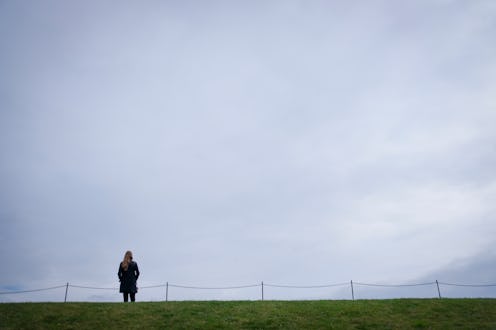Life
Is Facebook Making You Lonely?
Next time you go on Facebook, check out your "about" section: how much info do you share? Do you disclose personal information like relationship status, email address, your favorite films, or even your address? The amount of personal details that you share online can reflect your emotional state, including whether you're depressed or lonely, according to a new study by Charles Stuart University in Australia.
PolicyMic says that the study, which collected data from 616 female Facebook users, had a 50 percent share of participants who identified as "lonely." The other half identified as "connected." Of the "lonely" group, 79 percent described their favorite books and movies, and a staggering 98 percent disclosed their relationship status. Some members of the "lonely" group even shared their address. On the other hand, less than 65 percent of the "connected" group mentioned their favorite entertainment.
And that makes sense, the study's co-author, Dr. Yeslam al-Saggaf, told Market Watch.
The lonely participants "want to make it easier for others to initiate contact with them, which may help them overcome their feelings of loneliness."
Which might be a "duh" moment for plenty of people — isn't that what Facebook is for? But it's easy to get sucked into the social media network without necessarily realizing it. According to a 2013 study by the University of Michigan, people became less happy the more they used Facebook. In addition, a study from California State University in 2012 that evaluated Facebook users for psychological disorders found that people who like their friends' statuses and photos more often are more likely to demonstrate manic or compulsive symptoms.
However, the old saw of "correlation does not imply causation" holds true here. Just because some Facebook users overshare information and are also lonely does not mean that they all have an underlying mental state that causes them to hit the like button on every other item in their newsfeed. What the study does tell us is that it's worth noting your own Facebook behavior, or that of your close friends and family, if only to check for symptoms of depression or other issues.
On a personal level, this is something I can easily relate to. During the first month of my study abroad experience in Spain, I found myself posting on my new "Spanish profile" far more often than I normally would in order to make friends in an unfamiliar setting. At that point, I certainly would have described myself as "lonely." So while Facebook may not cause the loneliness and depression in the first place, it might not do much to help it, and it could even make the feeling worse.
But it depends on the way you use it: actively engaging with friends on Facebook is more likely to keep you happy. And it's important to remember that there are a variety of reasons for using Facebook. "I don't get on it to share every little detail of my life, like, 'Oh, what an awesome cup of coffee I had this morning,'" says the highly scientific source that is my mother. "But I'll post big things, like someone graduating. Or puppy pictures. Lots of puppy pictures."
